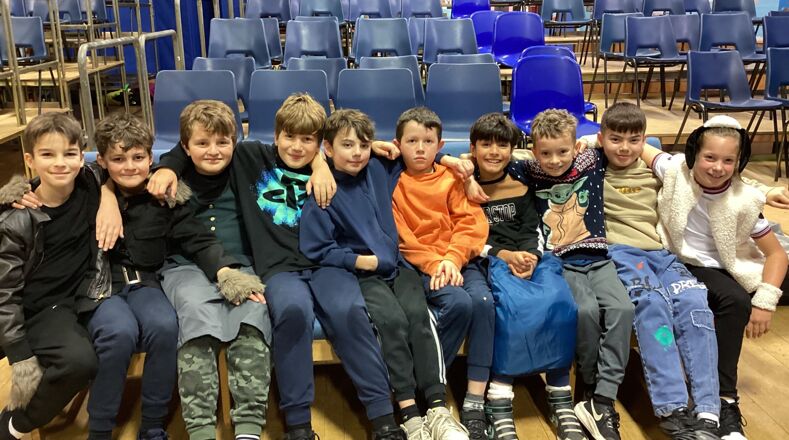- Home
- Info
- DOLPHIN news
- Wolves
Wolves
Back
Wolves
All you need for a performance are actors and a space for them to work in. That seems to be Judy Seall’s starting point, and over the years she has refined her approach more and more, paring down props and scenery so that all the focus is on characters, the action, and the words.
She has a knack for creating stories that call on the resources of a whole group of children, and in Wolves she tells a story of groups in conflict. The play explores how people relate, or do not, to the natural world, and hints at the possibility that “the sucking child shall play on the hole of the asp, and the weaned child shall put his hand on the cockatrice' den.” It is a play for our time, when the competition for natural resources puts so many at risk of disaster. The huge cast of Wolves, over thirty-strong, filled their space with vivid reality and their characters with telling conviction.
At the beginning of the evening we view a large empty stage backed with only two or three cut-out mountain peaks, and two or three shoe-box sized houses at the front.
Focusing on the place the wolf has taken in European history and myth, we follow a group of them roaming the wilds on the edge of civilisation. There have always been people who can reach out to wild animals, and Anwen Thomas as the free-spirited child brought up by wolves, breezed happily across boundaries others feared. A flock of sheep is set against the pack of wolves. The wolves, a humorous group whose taste seemed to be as much for chocolate as sausages, the sheep, Ninja sheep no less, suitably eye-masked in black, but still timid and mindless, with a particularly acrobatic Hannah Kennedy-George leading them around, under the care of Franklin Powell’s shepherd boy.
There’s always a character wanting to break bounds among humans, and in Wolves it was the Mayor’s son, the sullen, contrary Callum, brilliantly played by Albie Sutherland. He gets lost in the mountains during an avalanche, and learns that even in the wild not everyone is against him. The wolves manage to get him to put down the gun he has stolen from his house. His moment of self-realisation is tellingly focused when the girl Isla, played by Kiyomi Smallwood who lit up the stage whenever she appeared, is stopped in her tracks by his first apology; “He said sorry!” she says in stunned astonishment.“But it doesn’t mean I want to be friends with you” he stubbornly rejoins later in the script.
This is communal drama in a very real sense, with comically realised portrayals of life in a human community from bossy schoolteachers and opinionated tradesmen to cosy households: a particularly magical scene when the Wolf girl approaches the houses downstage, the lights go down, and those in the houses light up as she lifts their roofs to spy on the life inside them. What English comedy would be complete without its posse of bumbling bureaucrats. Norah Youssef’s oratund Mayor was a rib-tickling highlight, aided and abetted by her counsellors, Camden Collins, Roman Kowalczyk and Mollie Page.
What little scenery there was, the mountains in the background, model houses at the front of the stage, warmly lit from the inside, made a deep impact, as it should, no mere back-cloth. And after the terrors of nature have been unleashed and humanity learns to get along with its environment and the creatures who share it with them, the mountain peaks are lifted to reveal the peaceful life that lives under and around them.
Chris de Souza




